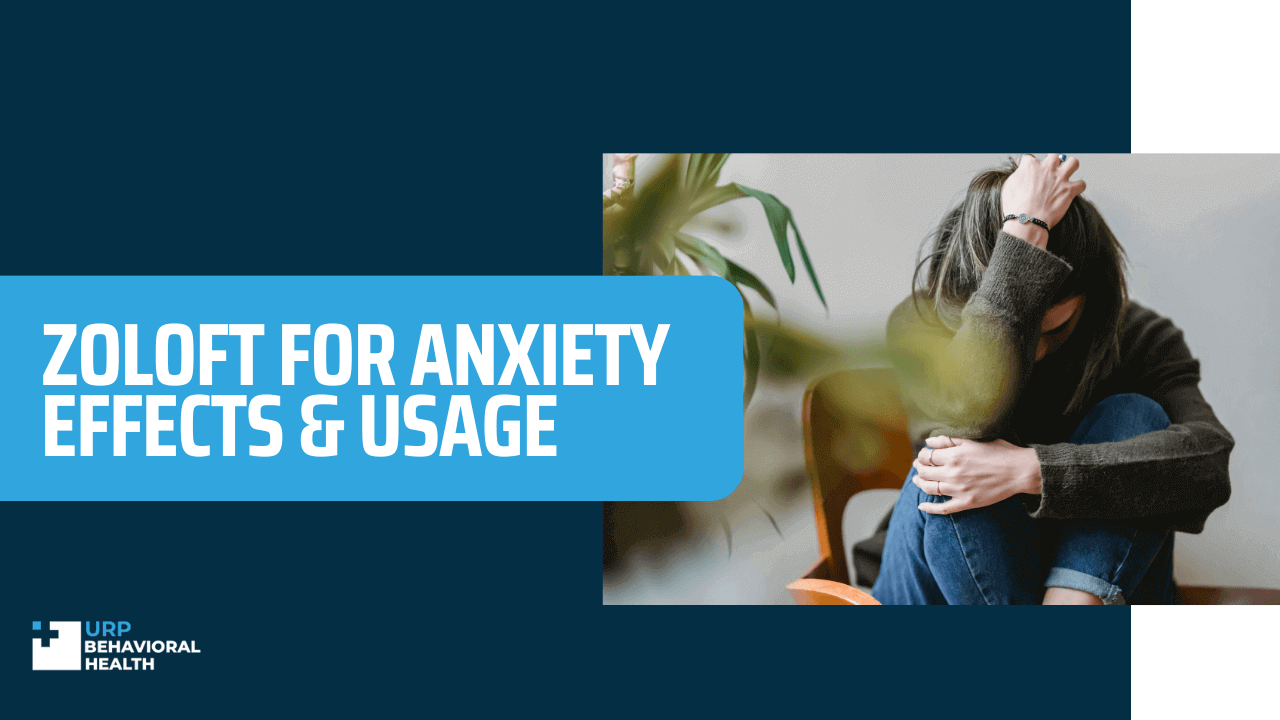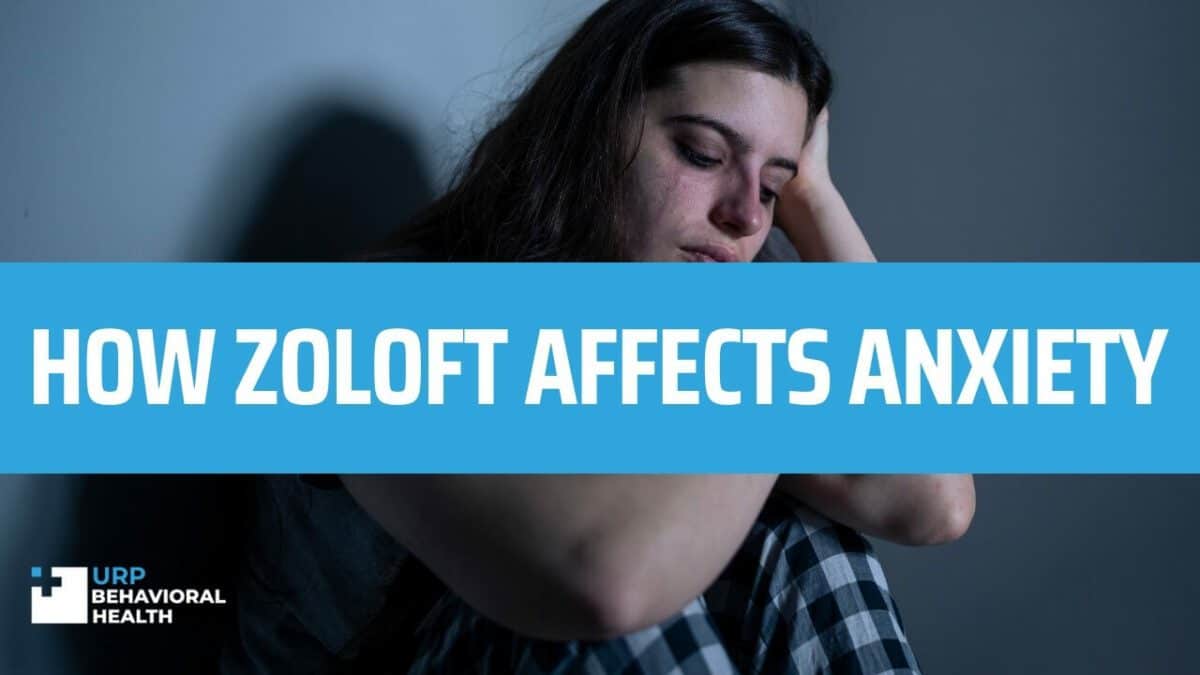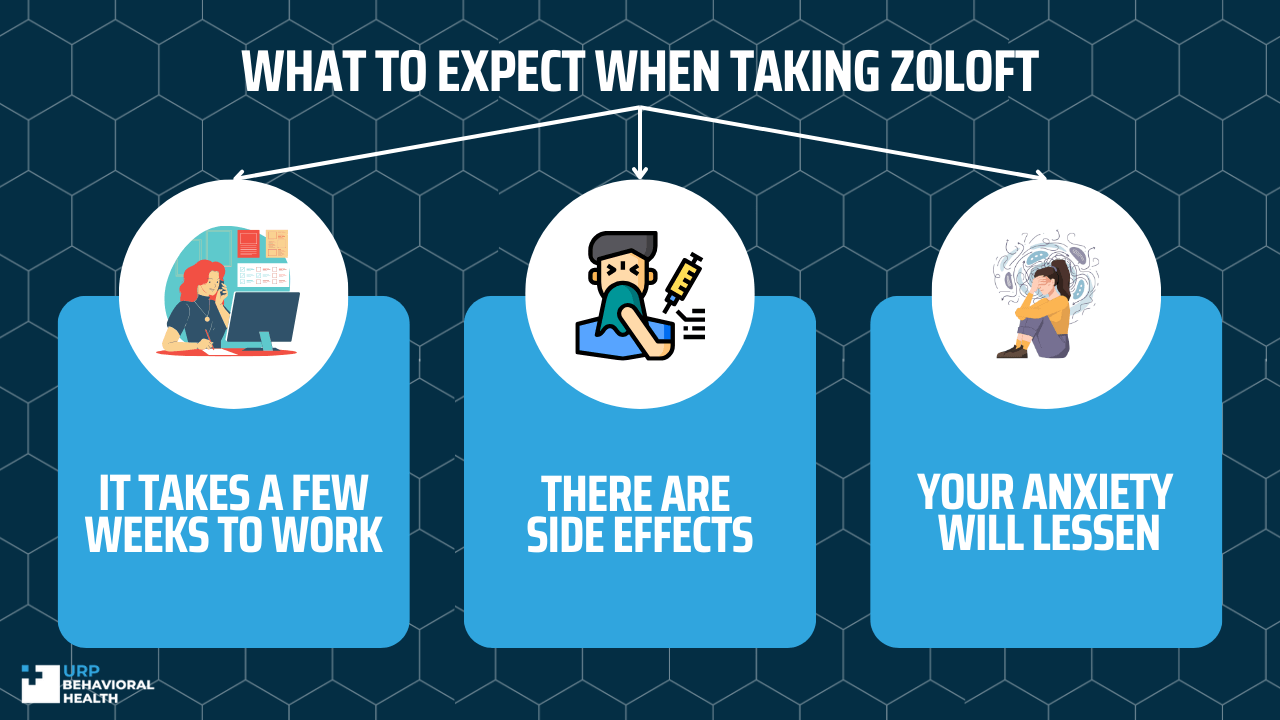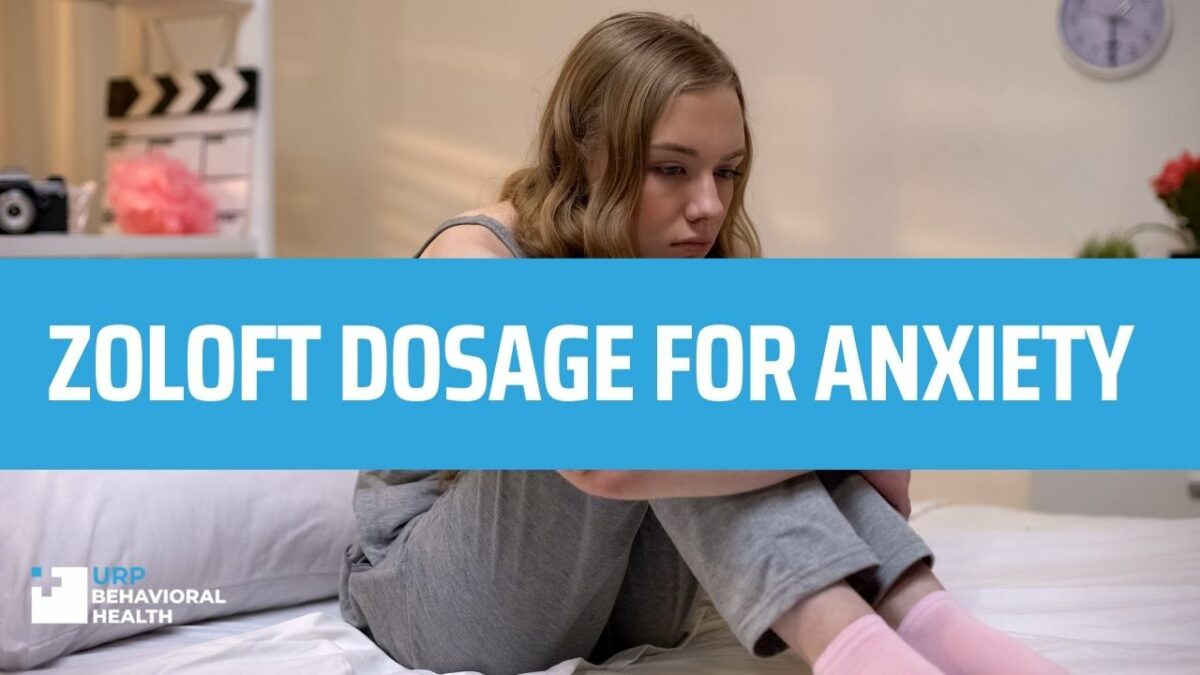
Zoloft for Anxiety | Effects & Usage
Statistics by the Anxiety & Depression Association of America indicate that anxiety disorders are the most common mental condition among US adults. However, only a small proportion of people with anxiety seek treatment. Among the different treatment methods available, most practitioners prescribe medication to alleviate anxiety symptoms. These days, pharmacotherapy is often combined with evidence-based treatments, such as psychotherapy.
One of these medications is Zoloft, an FDA-approved drug prescribed for anxiety and depression. Let’s look at how it works to alleviate anxiety, the right dosage, and other important details.
What is Zoloft?
Zoloft is the brand name of a medication, sertraline that alleviates mood disorders and anxiety. Sertraline is part of the antidepressant group called selective serotonin reuptake inhibitors, commonly referred to as SSRIs. This means it blocks the reabsorption of serotonin, a neurotransmitter and hormone that’s responsible for affecting your mood.
It allows serotonin to remain in the brain for longer, which improves your mood. Otherwise, the pre-synaptic neuron reabsorbs serotonin in the reuptake process.
Does Zoloft Help With Anxiety?

Although Zoloft doesn’t target feelings of anxiety, it’s helpful for improving your mood and alleviating anxiety symptoms. When you manage these symptoms, it’s easier to perform daily activities. Of course, practitioners prescribe it as part of a complete treatment plan, which can include other medications, lifestyle changes, and therapy.
Various studies have proven the effectiveness of Zoloft for anxiety, particularly when it’s combined with other treatments like CBT. According to one study including 60-year-old participants with anxiety disorder, Zoloft resulted in considerable decreases in worry symptoms [1].
Participants who received Zoloft in combination with CBT showed immense improvement in anxiety and depressive symptoms soon after treatment and at a three-month follow-up. Because of Zoloft’s efficacy when paired with therapy, it’s recommended to seek holistic treatment from a facility like URP Behavioral Health.
Using Zoloft for Anxiety Disorders
In addition to alleviating feelings of worry and depression, researchers have also found Zoloft to be effective for hard-to-treat anxiety. This is the case when you’re struggling with a condition like panic disorder.
Statistics show that around half of the people seeking treatment for generalized anxiety disorder don’t respond to initial treatment [2]. In most cases, this is a round of antidepressant therapy. In contrast, other SSRIs like sertraline have proven to be effective for the treatment of GAD and other anxiety disorders.
Zoloft is also highly effective for treating panic disorder, as proven in one double-blind study. The researchers wanted to determine the effects of Zoloft on people with panic disorder and found that it can alleviate full and limited-symptom panic attacks. The study not only showed that Zoloft is an effective treatment for panic disorder [3] but that it’s well-tolerated as well.
How Does Zoloft Work for Anxiety?

Once your doctor prescribes Zoloft for anxiety, it’s important that you know what to expect when you start taking it. Specifically, you should know when you can expect it to work, whether there are any side effects, and how you’ll feel.
How Long Does Zoloft Take to Work for Anxiety?
Unlike other medications like painkillers and antihistamines, psychiatric medications take some time to start working. So, if you’ve started taking Zoloft for anxiety, you can expect symptoms to alleviate in about two to six weeks. Zoloft won’t work for anxiety as soon as you take your first dose, so give it some time to start blocking the serotonin reuptake process.
SSRI antidepressants like sertraline will continue affecting the serotonin reuptake process over time until they reach maximum efficacy. That means your anxiety symptoms will get increasingly better as you continue taking Zoloft. So, if you’ve started taking it recently and feel discouraged about the results, give it some time.
More importantly, the medication will build up gradually and not all at once. If you’re not getting the results you want, avoid taking more than the required dosage. Instead, wait for 1-2 weeks before talking to your doctor and telling them that your symptoms aren’t improving.
Reach out today and let us create a treatment plan designed around your needs.

Side Effects Zoloft for Anxiety
Most studies indicate that sertraline is well-tolerated, but just like other medications, Zoloft can have some side effects. That being said, you should know which side effects to expect so you can speak with your doctor if they don’t subside.
Common side effects include indigestion, nausea, sleep disturbances, excessive sweating, and diarrhea. These usually occur when you start taking the medication and alleviate it as your body gets used to it.
In rare cases, people experience more serious side effects, such as worsening anxiety or depression, allergic reactions, or a manic episode. Before you start taking Zoloft, make sure to discuss any potential side effects, so you know what to do in case they occur. If you experience any serious side effects but aren’t sure of what to do, call emergency services for assistance.
Your Anxiety will Lessen
Many people wonder how they’ll feel once they start taking Zoloft for anxiety and if they’ll feel anything at all. After taking it for a few weeks, you’ll feel calm, relaxed, and relieved as your anxiety subsides. You can also look out for other changes, such as a positive change in your appetite and energy levels.
If you previously ate less or more because of worry, you’ll feel like your appetite is no longer influenced by anxiety. You’ll also be able to sleep better at night.
It’s possible that you’ll see an improvement in your quality of life because you can resume a balanced routine. When you’re no longer consumed by feelings of worry, you’ll be motivated to perform different activities.
Keep in mind that each person experiences the effects of Zoloft differently. So, it’s possible that your anxiety symptoms go away entirely or lessen to some extent.
Either way, you should speak to your doctor about how Zoloft is working for you. By giving them feedback, they can make changes to your treatment plan and dosage to improve your results.
Don’t wait - confidential help is available right now for you or your loved one.

Drug Interactions with Zoloft
Keep in mind that some medications can cause adverse reactions when taken with Zoloft. These medications include the following:
- MOAs, fentanyl, lithium, and tramadol can increase your risk of developing serotonin syndrome.
- Pimozide, which is taken to reduce motor and vocal tics, can lead to heart rhythm problems when taken with Zoloft.
- NSAIDs like aspirin can cause bleeding and bruising.
- Tricyclic antidepressants can lead to a buildup of medication in your system.
In addition to these medications, you should avoid taking grapefruit juice or grapefruit as it influences how your body reacts to the medication. Similarly, doctors recommend against consuming alcohol or taking other illicit substances with Zoloft as they impact the medication’s efficacy.
Who Shouldn’t Take Zoloft
Despite its anxiety-reducing effects, Zoloft isn’t the best choice when you have certain conditions. If you experience any of the following conditions, you may require a different medication.
- Seizures: Because seizures are already a potential side effect of taking Zoloft, you should consult your doctor if you have a seizure condition. You may experience an increase in the frequency or intensity of your seizures.
- Bipolar Disorder: Taking antidepressant medication can lead to a higher risk of experiencing a manic episode. If you have bipolar disorder, Zoloft can further complicate your symptoms.
- Liver Problems: Since the liver is responsible for breaking down medication, you may experience stronger doses of Zoloft if you have liver problems.
- Angle-Closure Glaucoma: If you have angle-closure glaucoma, taking Zoloft can result in an increase in glaucoma attacks. So, it’s best to speak with your doctor to find out if Zoloft is the right antidepressant for you.
Zoloft Dosage for Anxiety

Your prescription for Zoloft will depend on your symptoms and whether you have other medical conditions. For instance, if your anxiety symptoms are more serious, you can expect your doctor to prescribe a higher dose than someone with mild to moderate symptoms.
However, the usual dosage for anxiety [4] is 25 mg or 50 mg of Zoloft per day. Currently, the tablets are available in three dosages: 25, 50, and 100 (milligrams). The maximum dosage per day is 200 mg, which is taken in two 100 mg tablets.
An analysis of the efficacy of sertraline dosages shows that 50 mg per day is the most effective [5]. In addition to being proven effective, it’s also well-tolerated by most clients. If you’ve been prescribed 50 mg of Zoloft per day, but your symptoms aren’t improving, you should consult your doctor.
In most cases, doctors advise clients to increase the dosage at weekly intervals, but you should never initiate any changes on your own. Always ask for instructions from your healthcare provider before taking a higher dosage.
Is There a Risk of Overdose?
As long as you take the medication as directed by your healthcare provider, the risk of overdosing on Zoloft is low. However, if you’re worried that you’ve taken too much, you should seek medical help immediately. Overdosing on Zoloft can result in symptoms like diarrhea, vomiting, sweating, and drowsiness.
Moreover, taking Zoloft with other medications that affect your serotonin levels can increase your risk of serotonin syndrome. This is when the serotonin levels in your body are abnormally high.
Bottom Line
To sum it up, Zoloft is a suitable treatment for anxiety when prescribed as part of a complete treatment plan. Research shows that it’s highly effective when used alongside psychotherapy approaches like CBT, and that it’s well-tolerated as well. It works by blocking the reuptake of serotonin in the brain. The most common dosage for Zoloft is 50 mg per day, and it can take a couple of weeks for you to start experiencing its effects. If your symptoms don’t improve, speak with your healthcare provider for guidance.
Contact our admissions team now to begin your path toward a brighter future.

References:
- A randomized, controlled trial of the effectiveness of cognitive-behavioral therapy and sertraline versus a waitlist control group for anxiety disorders in older adults. Link: https://pubmed.ncbi.nlm.nih.gov/16505130/
- Management of treatment-resistant generalized anxiety disorder – PMC. Link: https://pmc.ncbi.nlm.nih.gov/articles/PMC7653736/
- Sertraline in the Treatment of Panic Disorder: A Double-Blind Multicenter Trial. Link: https://psychiatryonline.org/doi/full/10.1176/ajp.155.9.1189
- Link: https://dailymed.nlm.nih.gov/dailymed/drugInfo.cfm?setid=2d52e980-c419-4719-b928-29ad1f71647e
- Sertraline 50 mg daily: the optimal dose in the treatment of depression – PubMed. Link: https://pubmed.ncbi.nlm.nih.gov/8675965/
















